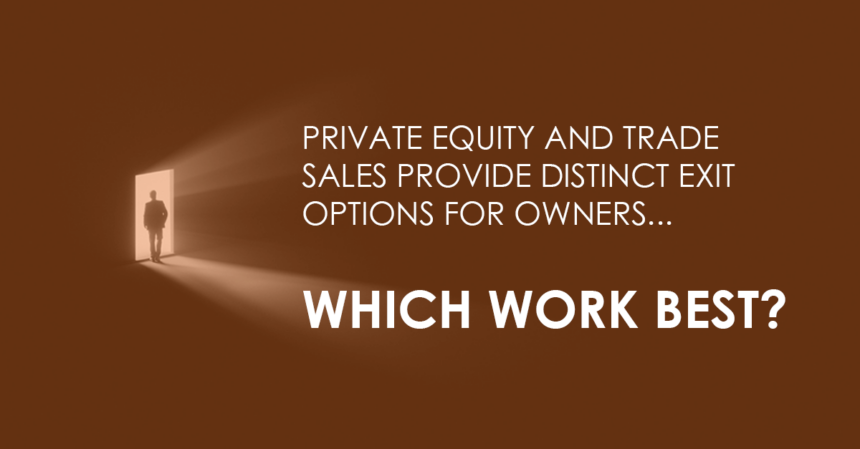Every business owner will have their own motivations for selling: these may include de-risking, retirement, personal ambitions, or even time to step-aside for the benefit of the business.
There are clear differences between Private Equity (PE) and Trade Sale transactions – the former is often seen as a ‘hedged-bet’, with some equity value realised, but a stake and involvement retained in the future growth, whereas the latter more commonly delivers a clean break. Whilst there is much overlap, how do they compare:
Private equity snapshot
- Owners continue in strategic or operational control (or at least with significant influence) . The management team’s own ambitions and plans are being backed.
- PE offers vendors the ability to ‘cash out’ some value, whilst rolling over equity alongside future value growth, alongside PE investors. The split of cash and rollover could vary between individuals and may suit management teams with varying individual objectives/exit ambitions.
- A PE backer will often provide funding for accelerated growth initiatives and possible acquisitions, typically in search of accelerated short-term growth
- PE firms often pledge committed business support, including access to group expertise and non-executive directorship appointments.
- PE is well versed in the onward sale, likely enhancing value on the second phase of an exit
- PE’s focus is very much on enhancing value for a exit in a relatively short time-frame, which can mean a change in business dynamic, favouring short-term exit ambitions over sustainable growth. This can be beneficial for aligned owners, but can rapidly shift business culture. Customer relationships can suffer the most.
Trade sale snapshot
- Larger range of buyers than PE, with less growth profile constraints than PE
- Fuller exit (value) – vendors typically realise a greater value of the business on day one, with cash or deferred elements enabling a greater de-risking
- Fuller exit (personal) – vendors can more readily walk away, to start new challenges or even a new business (subject to non-compete agreements!)
- Better strategic alignment – with the right buyer, less cultural change for the business, with focus on continued sustainable growth and longer term value creation
- Price – a strategically aligned buyer will often pay the strongest price
- Simpler deal mechanics – less due diligence and less drawn out deal process
- Dangerous whispers – greater risk that competitors become aware of failed or aborted transactions, or that the business is for sale
Which is better?
Of course, it depends. Trade buyers of private businesses will potentially pay higher values for more mature established businesses, whereas PE are often focused on strongly performing players in trendy sectors.
Those looking for a complete detachment from the business (or concerned that they may struggle to work for anyone else) may be better suited to a trade sale. PE may provide a highly-financially driven and focused strategic partner, enhancing short term value creation, but potentially to the greater detriment of the core legacy business values.
Value-wise, PE can offer a great option – it often depends whether former owners are willing to be part of a changed business dynamic. Where short-term growth can be unlocked and enhanced by PE-backing (often mid-market private businesses in growth sectors) and where compatible owners can get comfortable with short-term profit as the main driver, PE may work well. For other businesses, a more traditional trade sale may well remain the safer and more likely option.
Get in touch
The good news is, there are numerous options, with both PE and trade sale appetite currently high. To consider these (and other) options for your business, please get in touch with Magma’s Corporate Finance team below.
The Team
Our experienced and approachable team are on-hand to assist you, please get in touch below:


